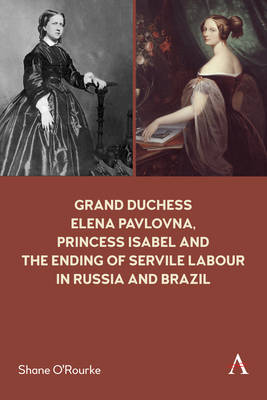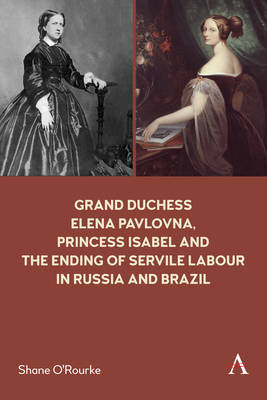
- Retrait gratuit dans votre magasin Club
- 7.000.000 titres dans notre catalogue
- Payer en toute sécurité
- Toujours un magasin près de chez vous
- Retrait gratuit dans votre magasin Club
- 7.000.0000 titres dans notre catalogue
- Payer en toute sécurité
- Toujours un magasin près de chez vous
Grand Duchess Elena Pavlovna, Princess Isabel and the Ending of Servile Labour in Russia and Brazil
Shane O'Rourke
40,45 €
+ 80 points
Description
Grand Duchess Elena Pavlovna and Princess Isabel were two of the most remarkable women of the nineteenth century; both are largely unknown in the English-speaking world. Elena Pavlovna was a German princess from the Kingdom of Wurttemburg who was selected to be the wife of Grand Duke Mikhail, the brother of Emperors Alexander I and Nicholas I. Princess Isabel was the daughter of the Brazilian emperor Dom Pedro II and heir to the throne. Both women were major players in the politics of emancipation in Russia in 1861 and in Brazil in 1888, respectively. Like many women, their political activities have been marginalized or completely written out of the historical record. This book chronicles the political lives of these two women, culminating in two of the most momentous emancipations of the nineteenth century. It does so in a way that sets the two women in the context of their societies. These societies were servile societies in the full sense of this phrase. Russia was the largest servile society in the world with over 40 million serfs at the time of emancipation while Brazil was the first slave society in the Americas and the last to free its slaves. The book emphasizes that the freeing of serfs in Russia and slaves in Brazil was part of the great wave of emancipations that began with the French Revolution. When that wave finally receded servile labor had been swept away from most countries in the world, including France (1789), Haiti (1793), Prussia (1807), the British Empire (1833), the Austrian Empire (1848), the Russian Empire (1861), the United States (1865), and ending with the freeing of slaves in Brazil in 1888. Too often, emancipation is looked at purely from a national view or one that is confined to the English-speaking world. Yet even from this truncated list it is clear that emancipation was a truly transnational phenomenon. The book adopts an explicitly comparative approach. By detailing emancipation in the Russian and Brazilian empires, this book offers a broader understanding of that process, showing what they had in common as well as what differentiated them. Both empires were monarchies in which the emperors ruled as well as reigned, both excluded women from any political role and both were servile societies. Without denying the importance of the struggles of the oppressed themselves for freedom or the impact of economic changes, this book prioritizes high politics as an essential component of Monarchy, gender roles, and emancipation converged in the persons of Grand Duchess Elena Pavlovna and Princess Isabel in ways that had a decisive impact on the course of emancipation and the form that it took.
Spécifications
Parties prenantes
- Auteur(s) :
- Editeur:
Contenu
- Nombre de pages :
- 120
- Langue:
- Anglais
- Collection :
Caractéristiques
- EAN:
- 9781839983160
- Date de parution :
- 12-09-23
- Format:
- Livre broché
- Format numérique:
- Trade paperback (VS)
- Dimensions :
- 152 mm x 229 mm
- Poids :
- 185 g

Les avis
Nous publions uniquement les avis qui respectent les conditions requises. Consultez nos conditions pour les avis.






